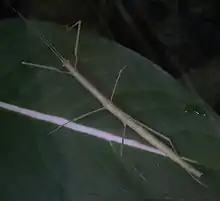Diapheromerini
Diapheromerini is a tribe of walkingsticks in the family Diapheromeridae. There are at least 30 genera Diapheromerini.[1]
_(21145913579).jpg.webp)
Northern Walkingstick, Diapheromera femorata
| Diapheromerini | |
|---|---|
 | |
| Paraclonistria nigramal | |
| Scientific classification | |
| Kingdom: | Animalia |
| Phylum: | Arthropoda |
| Class: | Insecta |
| Order: | Phasmatodea |
| Family: | Diapheromeridae |
| Subfamily: | Diapheromerinae |
| Tribe: | Diapheromerini |
Genera
These 37 genera belong to the tribe Diapheromerini:
- Alienobostra Zompro, 2001 c g s
- Bacteria Berthold, 1827 c g s
- Bactricia Kirby, 1896 c g s
- Bostra Stål, 1875 c g s
- Calynda Stål, 1875 c g s
- Caribbiopheromera Zompro, 2001 c g s
- Charmides Stål, 1875 c g s
- Clonistria Stål, 1875 c g s
- Diapheromera Gray, 1835Gray, 1835 i c g b s
- Dyme Stål, 1875 c g s
- Globocalynda Zompro, 2001 c g s
- Globocrania Hennemann & Conle, 2011 c g s
- Laciniobethra Conle, Hennemann & Gutiérrez, 2011 c g s
- Laciphorus Redtenbacher, 1908 c g s
- Libethra Stål, 1875 c g s
- Libethroidea Hebard, 1919 c g s
- Litosermyle Hebard, 1919 c g s
- Lobolibethra Hennemann & Conle, 2007 c g s
- Manomera Rehn & Hebard, 1907Rehn & Hebard, 1907 i c g b s
- Megaphasma Caudell, 1903Caudell, 1903 i c g b s
- Nanolibethra Conle, Hennemann & Gutiérrez, 2011 c g s
- Oncotophasma Rehn, 1904 c g s
- Paracalynda Zompro, 2001 c g s
- Paraclonistria Langlois & Lelong, 1998 c g s
- Paraphanocles Zompro, 2001 c g s
- Phanocles Stål, 1875 c g s
- Phanoclocrania Hennemann & Conle, 2011 c g s
- Phanocloidea Zompro, 2001 c g s
- Phantasca Redtenbacher, 1906 c g s
- Pseudobactricia Brock, 1999 c g s
- Pseudoclonistria Langlois & Lelong, 2010 c g s
- Pseudosermyle Caudell, 1903Caudell, 1903 i c g b s
- Pterolibethra Günther, 1940 c g s
- Sermyle Stål, 1875Stål, 1875 i c g b s
- Spinopeplus Zompro, 2001 c g s
- Trychopeplus Shelford, 1909 c g s
Data sources: i = ITIS,[2] c = Catalogue of Life,[3] g = GBIF,[4] b = Bugguide.net,[5] s = Phasmida Species File[1]
References
- "Phasmida Species File, tribe Diapheromerini". phasmida.speciesfile.org. Retrieved 2018-04-24.
- "Diapheromeridae Report". Integrated Taxonomic Information System. Retrieved 2018-04-24.
- "Browse Diapheromeridae". Catalogue of Life. Retrieved 2018-04-24.
- "Diapheromeridae". GBIF. Retrieved 2018-04-24.
- "Diapheromeridae Family Information". BugGuide.net. Retrieved 2018-04-24.
Further reading
- Arnett, Ross H. Jr. (2000). American Insects: A Handbook of the Insects of America North of Mexico (2nd ed.). CRC Press. ISBN 0-8493-0212-9.
- Borror, Donald J.; Peterson, Roger Tory; White, Richard E. (1998). A Field Guide to Insects. Houghton Mifflin. ISBN 978-0395911709.
- Bradley, James Chester; Galil, Bella S. (1977). "The taxonomic arrangement of the Phasmatodea with keys to the subfamilies and tribes". Proceedings of the Entomological Society of Washington. 79 (2): 176–208. ISSN 0013-8797.
- Brock, Paul D. (1999). The amazing world of stick and leaf-insects. The Amateur Entomologist. 26. The Amateur Entomologists' Society. ISBN 0-900054-63-8.
- Gillott, Cedric (1980). Entomology. Plenum Press. ISBN 0-306-40366-8.
- Kellogg, Vernon L. (1905). American insects. H. Holt.
- Majka, C. (2009). "Thomas L. Casey and Rhode Island". ZooKeys. 22: 267–283. doi:10.3897/zookeys.22.93.
- Misof, B.; Liu, S.; Meusemann, K.; Peters, R.S.; et al. (2014). "Phylogenomics resolves the timing and pattern of insect evolution". Science. 346 (6210): 763. doi:10.1126/science.1257570. PMID 25378627.
- Otte, Daniel; Brock, Paul (2003). Phasmida Species File: A Catalog of the Stick and Leaf Insects of the World. The Orthopterists' Society. ISBN 1-929014-03-1.
- Otte, Daniel; Brock, Paul (2005). Phasmida Species File: Catalog of Stick and Leaf Insects of the World (2nd ed.). Insect Diversity Association at the Academy of Natural Sciences, Philadelphia. ISBN 1-929014-08-2.
External links
 Media related to Diapheromerinae at Wikimedia Commons
Media related to Diapheromerinae at Wikimedia Commons
This article is issued from Wikipedia. The text is licensed under Creative Commons - Attribution - Sharealike. Additional terms may apply for the media files.